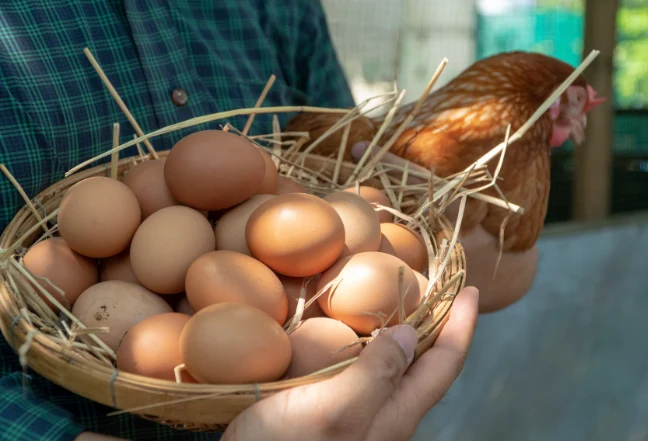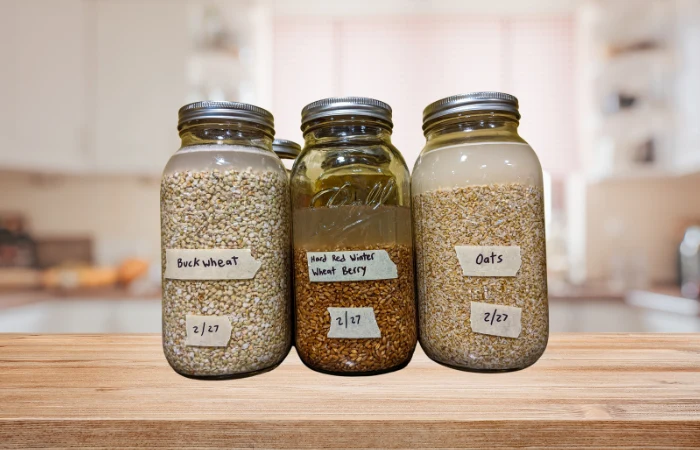The art of fermenting isn’t just for fine wines or craft beers. There’s a lesser-known champion in the world of fermentation, and it’s making waves in poultry farms: fermented grains.
If you’ve got chickens, ducks, or turkeys clucking and waddling around your yard, read on to discover the magic of fermented grains and why it could be the game-changer your feathered friends need!
Fermentation through the Ages: A Very Brief History Lesson
Before refrigeration, fermenting was one of the primary methods to preserve food. Remember Captain Cook? On his second voyage in the 1770s, he used sauerkraut to prevent scurvy among his crew.
While we don’t have recorded tales of poultry dining on fermented grains from eons ago, it’s safe to assume that animals have long benefited from this practice in various parts of the world.
So, Why Fermented Grains for Poultry?
- Improved Digestion: Fermentation breaks down grains into more digestible forms. This means that your poultry will absorb more nutrients, leading to happier and healthier birds.
- Probiotic Power: Fermented grains are chock-full of beneficial bacteria. This improves gut health, aids in digestion, and can even boost the immune system.
- Economic Efficiency: By enhancing nutrient absorption, you’ll find your birds eat less but receive more nutritional value. That’s a win-win for your pocket!
Choosing the Best Grains for Fermenting
When it comes to fermenting grains for poultry, not all grains are created equal. Some pack more of a nutritional punch, while others might be more cost-effective. Let’s delve into some popular choices and compare their benefits for both the bird and the budget-conscious owner.
Wheat
- Bird Benefits: A rich source of energy, wheat also contains essential proteins and minerals. It’s particularly high in phosphorus and magnesium. Fermented wheat can aid in better eggshell quality, brighter yolk color, and improved layer performance.
- Owner’s Pocket: Generally, wheat is moderately priced, but it can vary based on regional availability.
Barley
- Bird Benefits: Barley is excellent for gut health. Its fibrous content promotes better digestion and firmer droppings. When fermented, barley aids in improving the body weight of broilers.
- Owner’s Pocket: Barley tends to be less expensive than wheat but is more region-specific. If locally available, it can be a cost-effective choice.
Oats
- Bird Benefits: Oats are enriched with beta-glucans, which are beneficial for immune health. They also provide essential amino acids, which can lead to glossier feathers and healthier skin.
- Owner’s Pocket: Oats can be on the pricier side compared to barley and wheat, but their nutritional benefits might justify the extra pennies.
Corn (Maize)
- Bird Benefits: Corn is energy-dense and can be a great way to fatten birds or keep them warm in winter. It contains essential fatty acids and antioxidants. Fermented corn can lead to richer colored yolks.
- Owner’s Pocket: Corn prices vary greatly based on the region and season. It can be economical in corn-producing areas such as the Midwest.
Rye
- Bird Benefits: Rye is a powerhouse of manganese, phosphorus, and magnesium. It can help in strengthening the bones and ensuring robust health for your birds.
- Owner’s Pocket: The cost of rye can be comparable to wheat, though it might not always be as readily available.
Making an Informed Decision
Each grain offers unique benefits, but the choice ultimately depends on your specific goals for your poultry, their current health, and your budget. A combination of grains can also be a good strategy. For instance, blending higher-priced oats with more economical barley can give your birds a balanced diet without breaking the bank.
In short, while fermented grains provide a myriad of benefits, the type of grain you choose will shape those advantages.
But here’s something else to consider… fermented grains carry some serious nutritional benefits not just for your chickens, but for their eggs as well.
How Fermented Grains Enhance Egg Production and Nutrition

When it comes to the produce of our poultry, especially eggs, quality is a big concern. As it should be! You know that what you feed your chickens plays a significant role in the quality of the eggs they produce, let’s unravel the connection between feeding fermented grains and the results you’ll likely enjoy every morning.
Improved Egg Production
- Consistency in Laying: Fermented grains offer an easily digestible and more bioavailable source of nutrients. This aids in consistent egg production. Simply put, happy, well-fed hens lay more regularly!
- Strengthened Eggshells: The bioavailability of calcium and phosphorus from fermented grains can lead to stronger eggshells. No one wants a brittle egg that cracks at the slightest touch.
Enhanced Yolk Color and Taste
- Richer Yolk Color: Hens fed with fermented grains, particularly those with corn and barley, often produce eggs with a richer and deeper yolk color, indicative of higher carotenoid content. This doesn’t just make for a prettier plate but suggests a more nutritionally dense yolk.
- Improved Flavor: Many poultry enthusiasts and farmers report a noticeable difference in the taste of the eggs. Eggs from hens fed fermented grains tend to have a richer, more “egg-y” flavor.
Nutritional Boost
- Increased Omega-3 Fatty Acids: Omega-3s are essential for human health, and they’re also beneficial for our feathery friends. Fermented grains can increase the Omega-3 content in eggs, which is a plus for those consuming them.
- Higher Vitamin Content: There’s evidence to suggest that fermentation can increase the B-vitamin content in grains. When these grains are fed to poultry, it can lead to eggs with a higher concentration of these essential nutrients.
A Peek into the Science
The process of fermentation breaks down anti-nutritional factors in grains. Phytic acid, for instance, binds essential minerals like calcium, zinc, and iron, reducing their bioavailability.
When grains undergo fermentation, the phytic acid content reduces, making these minerals more accessible and absorbable. This improved nutrition profile translates directly to the quality and nutritional value of the eggs.
Feeding fermented grains to poultry isn’t just a throwback to ancient farming practices; it’s an informed choice for modern-day poultry keepers who prioritize both the health of their birds and the quality of the eggs.
So, the next time you crack open a brilliant, rich yolk from your backyard hen, remember it’s not just an egg; it’s a testament to the power of good nutrition!
Setting up Your Fermenting System: A Step-by-Step Quick Start Guide
- Select Your Container: You can use food-grade buckets, glass jars, or any non-reactive container.
- Choosing Grains: Whole grains like wheat, barley, and oats are great choices. Start with the cheapest of options and go from there.
- The Fermenting Process:
- Fill one-third of your container with grains.
- Add water, leaving a few inches at the top.
- Stir well and cover with a breathable cloth, securing it with a band or string.
- Store in a warm location (ideally around 60-70°F or 15-21°C).
- Stir once or twice a day.
- Within 3 to 4 days, you should see bubbles – a sign of successful fermentation!
How Often Should You Feed?
It’s safe to incorporate fermented grains into your poultry’s daily diet. However, it shouldn’t be their only food source. Aim for fermented grains to make up about a third of their diet, with the remainder being their regular feed and supplemental foods.
More To Discover
It’s not just about jumping on a trend or going back to ancient practices. Feeding your poultry fermented grains is about prioritizing their health, wellness, and the quality of the eggs or meat they produce.
I found a great ten-minute video on YouTube that details how to ferment cheap grains for your chickens. Give it a quick watch!


















